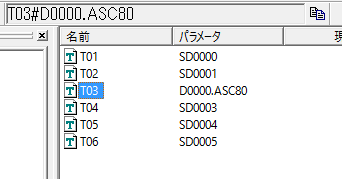About the parameter string
A parameter string is a string that represents the device type, address, bit position, type, etc.
The FA-Server toolbar shows the parameter strings for the selected tag. If you want to know what parameter strings are specified for the PLC you are connecting, the toolbar display will give you the information.
In the example below, it is "T03#D0000.ASC80".

Parameter strings are primarily used in the following situations:
▪Configuring Active tag
When setting
Active tag, specify "#parameter string" as follows:
example)
U01.F01.#D0000 U01.F01.#X0000.BIN16 U01.F01.#D0.ASC80 |
▪Application configuration file (in XML format)
In the configuration file, the strings that represent each object use the format "name#parameter string".
▪Tag CSV file (CSV format)
The format "name#parameter string" is used in strings that represent units, folders, and tags in a file.
|
For a standard PLC, the parameter string has the following format (excluding filter settings):
#[Device type][Address]@[Bit position].[Type][Size]
Example 1) #X0 Link "X0" as a bit Example 2) #D0 Link "D0" as 16-bit binary Example 3) #X0.BIN16 Links "X0" to "X15" as a 16-bit binary Example 4) #X0.BCD8 Links "X0" to "X7" as two-digit BCD Example 5) #D0@4.BCD12 Links bits 4 to 15 of "D0" as a 3-digit BCD Example 6) #D0.BIN-4 Link bits 0 to 3 of "D0" as signed binary Example 7) #D0.ASC80 Links "D0" to "D4" as 10 ASCII characters (5 characters for double-byte characters)
■ [Device type] (required) Specify the name of the device you want to access (such as "X", "Y", "D", or "M").
■[Address] (Required) Specifies the address of the device you want to access.
■@[bit position] (optional) You can specify which bit of the address to reference in bit units. In that case, the bit number is counted from the bottom of the address, and the least significant bit is "0". If the bit position is omitted, the least significant bit is referenced.
■[Type] (Optional) Specify the tag type using the following keywords:
[Type] is optional. If omitted, "BIT" will be automatically selected if the unit of the specified device is bits, and "BIN" will be automatically selected if the unit is bytes or words. However, this cannot be omitted if [Size] is specified.
■ [Size] (Optional) Specify the tag size in bits. The size that can be specified is subject to the following restrictions depending on the type specified in [Type]. If "Bit" is specified in [Type], [Size] cannot be specified.
[Size] is optional. If it is omitted, the size shown in the table below will be specified based on the specified [Type] and the specified device unit (see the "Device List" table for each model).
|